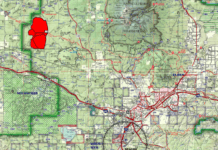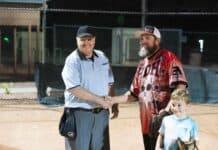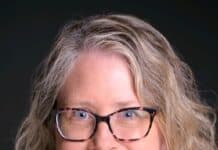Ximena Velazquez-Hernandez earned a degree in Spanish and a minor in law from the University of Arizona in May. A 2019 Sedona Red Rock High School graduate, Velazquez-Hernandez said she plans to take the Law School Admission Test with the intention of going on to law school next year. She is currently volunteering at the Tucson courthouse and plans to practice immigration law.
Her four years of college education was enabled in part by a major scholarship donation from Sedona residents, Cheryl and Billy Geffon. The Geffons recognized Velazquez-Hernandez at the SRRHS scholarship night ceremony in May 2019.
“We went out for dinner before the ceremony, and we were just like getting to know each other a little bit better and it was still surreal for me at that moment. I still had not believed that I had gotten a scholarship,” Velazquez-Hernandez said. “When it’s my turn to go up, Billy and Cheryl gave a little speech and they talked about what they were looking for, what they thought about me, and then that’s when they gave the award of $80,000. I remember my reaction. Am I hearing you right? I was surprised,” Velazquez- Hernandez said.
“There’s a video of my reaction and I remember I started crying. My parents were surprised. They were like, ‘Oh my God, is this true?’ And that’s when I realized, I’m going to college.”
Velazquez-Hernandez said the amount of money was overwhelming.
“We all cried that day,” she said. “We couldn’t believe it. It was very sweet and I will always remember that. I felt like it was too good to be true. Just because it wasn’t very common that a student with an immigrant background would get a scholarship or at least that I knew of.” “So, for me, I thought maybe this opportunity would be taken away from me at any time, at any point, and thinking it’s too good to be true,” Velazquez- Hernandez said.
DACA
While she was growing up in Sedona, Velazquez-Hernandez said both of her parents worked two jobs. When she came home from school, her older sister Alejandra would take care of her. After her sister took up other activities, she joined a club that provided after-school care.
“I never really got to see my parents; it was always me and my sister,” Velazquez-Hernandez said. “I remember growing up and being afraid when my dad would get stopped by the police for immigration stuff. At a very young age, I had to try and understand [what was happening] and to be mature in that aspect. Every time I would get in trouble in school, I would be fearful because I didn’t know what the consequences would be.”
Velazquez-Hernandez was about five years old when her family moved from Mexico City to the United States. Neither a U.S. citizen nor a lawful permanent resident, her immigration status is classified under the Deferred Action for Childhood Arrivals program, a policy created in 2012 to protect eligible applicants who were brought to the U.S. as children, shielding them from deportation by providing them with work authorization for temporary, renewable two-year periods. While DACA protects about 580,000 individuals nationally and 51,000 in Arizona from being deported, it does not provide a pathway to U.S. citizenship or residency. Velazquez-Hernandez said that as a child, she dreamed of becoming a lawyer in the hope of one day helping her family by finding a solution to immigration laws. She asked her SRRHS guidance counselors about attending college.
“They told me I had two options,” Velazquez- Hernandez said. “It was either through academics by getting good grades, becoming involved in activities after school and doing community service, or I could join the military.”
Applying for College
She said that she began to apply to colleges before she knew how she was going to pay for continuing her education.
“In my junior year, I was talking with my counselor, and I wanted to continue studying,” Velazquez-Hernandez said. “I had a timeline detailed of everything I wanted to do and how I wanted to do it. My advisor said, ‘You don’t have to stress or worry if you apply at the beginning of the first semester of your senior year, because by December, you will know which colleges accepted you and which didn’t, and from there, we can work on getting a scholarship.’”
Velazquez-Hernandez was accepted to Northern Arizona University, Arizona State University and the University of Arizona. She applied for scholarships but became discouraged due to her DACA status and her inability to participate in after-school activities or community service and began to feel that obtaining any financial assistance would be unlikely. Teresa Lamparter, an administrative assistant with SRRHS, then told her that she had an interview with Billy and Cheryl Geffon, who had been Sedona residents for 18 years.
“At that point, I didn’t really know what was going to happen,” Velazquez- Hernandez said. “I went in there with a really clear and open mind as to what an interview would look like and how it would go. I remember from the moment I walked in, I really felt comfortable talking with them [and sharing] my backstory as well as what I wanted to do in the future. I was a bit shy, though. I do remember that and felt I wasn’t able to express myself fully.”
The Geffons
Two days later, the Geffons wanted to meet with Velazquez-Hernandez and her family. Originally from New York City, Billy Geffon worked on Wall Street and Cheryl Geffon was a teacher.
“I started out as a high school English teacher and found kids who couldn’t read,” Cheryl Geffon said. “So I went back [to college] for another degree as a reading specialist. As I taught older kids who couldn’t read, I became involved in a fabulous, fabulous program that was kind of an intervention, teaching younger kids to read.”
Geffon found her work rewarding and said that education was always important to her, although she and her husband did not have children of their own.
“We feel very fortunate. We were able to retire young and we had enough money to live, and we did have the money to do something,” Geffon said. “We used to donate [to different organizations] because we wanted to be philanthropic, both of us.”
The Geffons worked closely with Lamparter, who helped set up interviews with eligible SRRHS students.
“We had a process,” Geffon noted. “There was a questionnaire the student needed to fill out. We were looking for drive, ambition and, of course, academic potential. Those were our criteria, but the academic need was really important to us.”
Geffon said that although there were several students they interviewed, Velasquez-Hernandez was the one they wanted to support.
“When we interviewed Ximena, we were instantly awed. We didn’t even go any further because we knew it was going to get really hard if we started meeting other kids. We were totally impressed,” Geffon said.
After the Interview Velazquez-Hernandez said that she went home and did not tell her parents about meeting the Geffons.
“I walked through the door, and I didn’t say anything,” Velazquez-Hernandez said. “I went straight to my room. My whole family was on the couch. It was a very interesting moment because I was like, did I do something wrong? I still hadn’t told them because I didn’t believe in myself. I was still processing the whole situation. They said, ‘Aren’t you going to tell us something?’
After the interview, Velazquez-Hernandez had little contact with the Geffons. She had written them a thank-you note and sent them a copy of her high school photo, inviting them to the scholarship ceremony in May, where they presented her with the windfall scholarship.
University of Arizona
Moving to the University of Arizona in Tucson was the first time that she was away from her family and she found adjusting to college life to be challenging.
“I did have difficulties because I thought college would be the same as high school,” she recalled. “It is more up to you to be disciplined. You go to class because you want to — it wasn’t like high school because you had to. “The first few weeks, I felt out of place. I realized that I didn’t know how to make friends. In every class, I had different classmates, different majors and minors, so it was expanding my horizons but at the same time realizing I’m very timid. I was able to learn a lot about myself.”
During her sophomore year, the COVID- 19 pandemic response measures peaked. Students were told to return home and she found herself in a quandary. “It was the week before my birthday, and I had returned to campus just to pack my things,” Velazquez- Hernandez said. “I was struggling to find storage. I was struggling to find a way back because I had returned on a bus and all the public transportation was canceled.” “I was panicking because I had nowhere to stay, I’m in Tucson four hours away from home,” she said.
Over her four years in college, Velazquez-Hernandez managed to find a balance. She interned at the resource center for immigrant students, helping DACA recipients.
“I accomplished a milestone that I promised myself, promised my family, as well as made a promise to the Geffons,” Velazquez- Hernandez said. “I was able to learn a lot of new things and realized how much I had grown in four years.”
Cheryl Geffon and Velazquez-Hernandez’s family came to her graduation. She described the Geffons as her American grandparents who have taught her many lessons, especially the lesson of paying it forward. “I want to help my community in every way possible and help those who need it,” Velazquez-Hernandez said. “I think that’s one thing that has driven me, just because I grew up seeing the barriers along with the struggles. But there’s always a way. If a door closes and another one does, there’s a window and you know, have faith and hope.”



















